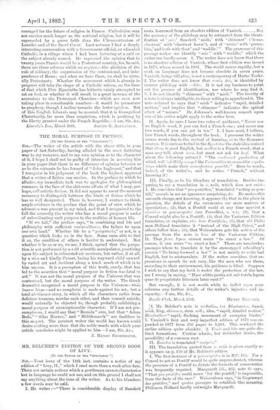THE MORAL PURPOSE IN FICTION.
LTO THE EDITOR OF THE " SPECTATOR.")
SIR,—The writer of the article with the above title, in your paper of last Saturday, having alluded in the most flattering way to my romance, and to my own opinion as to the character of it, I hope I shall not be guilty of intrusion in assuring him in your pages that there is no difference of opinion between us as to the estimate he has formed of "John Inglesant," and that I recognise in his judgment of the book the highest approval that a writer of fiction can receive. In the preface to which he alludes, my immediate task was to apologise for philosophical romance, in the face of the elaborate efforts of what I may, per- haps, call artistic fiction. It did not appear to me at the moment necessary to distinguish between the kinds of fiction which he -has go well designated. There is, however, I venture to think, ample evidence in the preface that the point of view which he advocaOs was present in my mind, and tl-at I recognised to the full the necessity the writer who has a moral purpose is under of subordinating such purpose to the realities of human life.
"If we fail," the preface says, "in combining real life and philosophy with sufficient vraisemblance, the failure be upon our own head." Whether life be a "purgatorio," or not, is a question which looks us in the face. Some seem able to find it so, the condition of others is harder to understand. But whether it be so or no, we are, I think, agreed that the purga- tion is not performed by a cold scientific manipulator, practising upon his subject in exhausted-air receivers, but rather, if at all, by a wise and kindly Parent, luring his wayward child onward by varied art and incident along a track much of which is to him unseen. It is a perception of this truth, surely, that has led to the assertion that "moral purpose in fiction was fatal to art." It was not the moral purpose of the Universe that was contemned, but the moral purpose of the writer. The Greek dramatist recognised a moral purpose in the Universe—Clei.3y i'votecop Zileav—and no complaint is made against his art; but a total-abstinence story, in which all the characters suffer from delirium tremens, murder each other, and then commit suicide, would naturally be objected to, though probably exhibiting a moral purpose of unexceptionable character. If I am not pre- sumptuous, I would say that " Romola" errs, but that "Adam Bede," "Silas Merrier," and " Middlemarch " are faultless in this respect. The greatest writer the world has known could -desire nothing more than that the noble words with which your article concludes might be applied to him —I am, Sir, &c.,
J. HENRY SHORTHOITSE.














































 Previous page
Previous page